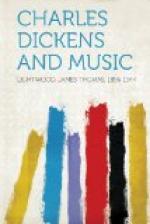with his hat in his hand,
gave a beat upon the crown
at every division of his sentences,
as if it were
a tambourine;
and in the same work the electric wires rule ’a colossal strip of music-paper out of the evening sky.’
Perhaps the most extraordinary comparison is that instituted by Mrs. Lirriper in reference to her late husband.
My poor Lirriper was a handsome
figure of a man,
with a beaming eye and a voice
as mellow as a musical
instrument made of honey and
steel.
What a vivid imagination the good woman had! Her descriptive powers remind us of those possessed by Mrs. Gamp in speaking of the father of the mysterious Mrs. Harris.
As pleasant a singer, Mr.
Chuzzlewit, as ever you heerd,
with a voice like a Jew’s-harp
in the bass notes.
There are many humorous references to remarkable performances on various instruments more or less musical in their nature. During the election at Eatanswill the crier performed two concertos on his bell, and shortly afterwards followed them up with a fantasia on the same instrument. Dickens suffered much from church bells, and gives vent to his feelings about them in Little Dorrit, where he says that
Maddening church bells of
all degrees of dissonance,
sharp and flat, cracked and
clear, fast and slow,
made the brick-and-mortar
echoes hideous.
In his Pictures from Italy he wrote thus:
At Genoa the bells of the church ring incessantly, not in peals, or any known form of sound, but in horrible, irregular, jerking dingle, dingle, dingle; with a sudden stop at every fifteenth dingle or so, which is maddening.... The noise is supposed to be particularly obnoxious to evil spirits.
But it was these same bells, which he found so maddening, that inspired him with the title of a well-known story. He had chosen a subject, but was at a loss for a name. As he sat working one morning there suddenly rose up from Genoa
the clang and clash of all its steeples, pouring into his ears, again and again, in a tuneless, grating, discordant jerking, hideous vibration that made his ideas spin round and round till they lost themselves in a whirl of vexation and giddiness, and dropped down dead.... Only two days later came a letter in which not a syllable was written but ’We have heard THE CHIMES at midnight, Master Shallow,’ and I knew he had discovered what he wanted.[11]
Yet, in spite of all this, Dickens shows—through his characters—a deep interest in bells and bell-lore. Little Paul Dombey finds a man mending the clocks at Dr. Blimber’s Academy, and asks a multitude of questions about chimes and clocks; as, whether people watched up in the lonely church steeples by night to make them strike, and how the bells were rung when people died, and whether those were different bells from wedding-bells, or only sounded dismal in the fancies of the living; and then the precocious small boy proceeds to give the astonished clockmaker some useful information about King Alfred’s candles and curfew-bells.




